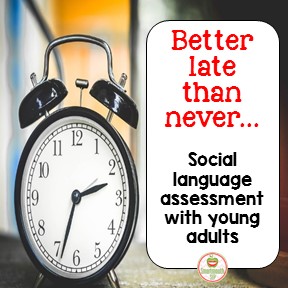
I had the opportunity to work with a young adult who was recently diagnosed as being on the autism spectrum. Evaluation at this age is tricky, as some of the standardized tests that we use in the schools age out at 17-11. It is not uncommon for my students who are on the autism spectrum to come to their diagnosis rather late, especially if they are higher functioning and doing well academically. They are often diagnosed as having ADHD, sensory integration disorder, mood disorders, sleep disorders and/or learning disabilities first. These can exist co-morbidly in some people with ASD and it is difficult to tease apart one from the other. I ran across this great blog written by a woman diagnosed with ASD at age 36, that really spoke to me regarding the topic of later diagnosis.
After testing my student with a few standardized measures, the meat of the evaluation was done using a variety of non-standardized tools such as the Double Interview from Social Thinking ®, direct observation, conversation with the parents, gaining feedback from the teachers, giving parts of the Informal Social Assessment from Super Power Speech and utilizing the Social Language Development Test-Adolescent for information only (as the student was older than 18 and norms end at 17-11). A standardized test score from the supra-linguistic portion of the CASL or the social checklist and activities on the CELF 5 will yield some good information, however my higher functioning students can do these highly structured tasks well but still struggle socially in the fast, ever changing day to day applications. I find that the non-standardized pieces truly give you a better picture of the person’s social skills and social competency, and the resulting narrative is much more descriptive than a standard score.
I came across a treasure trove of articles on the Social Thinking® website, including a three part series on transitioning into adulthood for people on the spectrum and another about including the young adult as part of their planning team when working on social language competencies. Explaining what social language is and how having ASD impacts our social relationships with others is so important for the family as well as the person with ASD, especially when a diagnosis has come later in life after many challenges. I also really like the website Wrong Planet , as it is created and hosted by 3 young adults on the spectrum. It has great content that connects with many young adults, such as finding and keeping a job, dating, and post-secondary education options. I also love the blog series by Autism Classroom News on teaching the Hidden Rules curriculum and how understanding these rules are crucial to keeping our students and young adults with ASD employed and even out of legal trouble.
We need to consider how to support our students exiting public school with later diagnosis of ASD and help them transition successfully into early adulthood. What resources have you found to help with this transition? Share here!